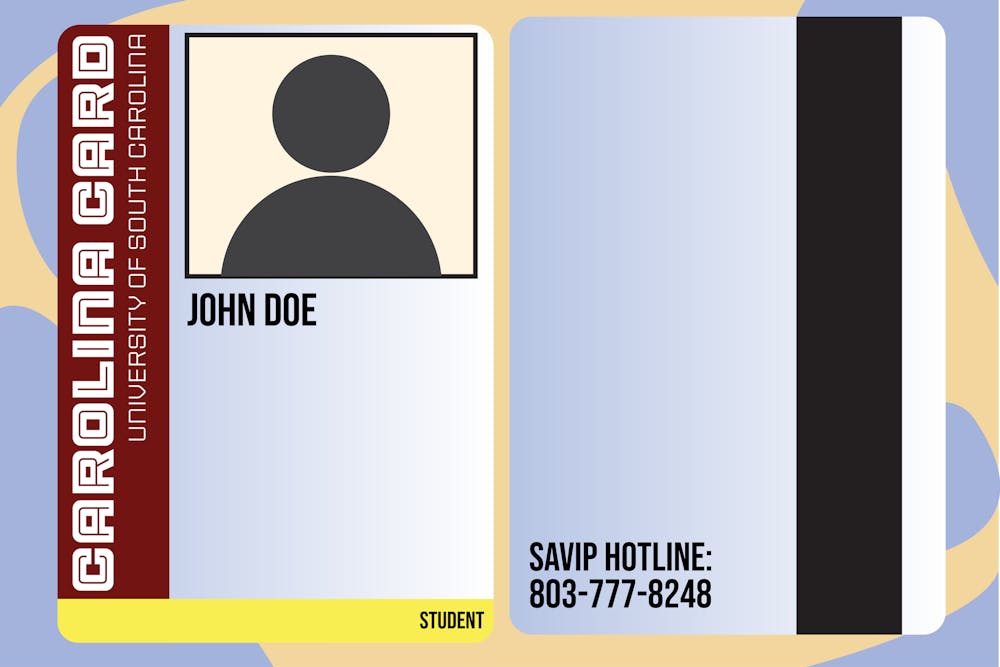USC students, faculty and staff could see a change to their CarolinaCards in the fall 2024 semester with the addition of the Sexual Assault and Violence Intervention & Prevention hotline to the back of all future cards.
The SAVIP hotline is available 24/7, and it connects members of the USC community with confidential interpersonal violence advocates. The hotline also provides support for various scenarios, including academic assistance as well as housing and workplace accommodations, said Ashley Quirk, the associate director of SAVIP.
"Our advocates provide support — really empowerment-based support — to primary and secondary survivors of interpersonal violence," Quirk said. "Here, we define interpersonal violence as any form of violence. ... Some of the key areas are sexual assault, domestic, dating, relationship violence, any kind of stalking and harassment."
Quirk said putting the hotline on the back of CarolinaCards is just an extra measure to ensure that the number is easily accessible to people.
Aidan Gruner, a first-year exercise science student and student senator, said the prototypes for the new CarolinaCards were developed over spring break and the next step is to physically print them out. The goal is to have the new prototypes finalized so that they will be available for the incoming freshman class to receive cards with the hotline.
For students and staff who already have CarolinaCards, they will not have to get a new one unless their current card is lost or needs to be replaced, Gruner said.
Gruner wrote the bill that proposed the addition of the hotline to the back of CarolinaCards. He said the bill holds a personal significance for him, which inspired him to advocate for it.
"The inspiration behind the bill actually dates back to the same reason I chose to join senate, which was because I was hearing a lot of different cases regarding sexual assault (and) harassment, and I wanted to make a difference for that," Gruner said. "After a couple of my friends had circumstances where a few of them were assaulted or mistreated, that was, you could say, the nail in the coffin that led me to want to do everything I could to advocate and help make change and to hopefully bring a resource that could help so many others."
Gruner said he sought a resource that could effectively address students' needs, such as advocacy, legal assistance and counseling, and he found that SAVIP encompassed all of these aspects. He observed that there's still a lack of awareness among many students — mainly underclassmen — regarding the organization and now aims to increase awareness about the organization and the resources it can provide to students.
Since Gruner's bill was passed at the end of February, he has been able to visit various campus offices, such as SAVIP and CarolinaCard, to ensure his legislation is enacted.
"Senator Gruner came to me kind of with this initiative and really a passion for making sure that folks in the Carolina community knew about ... the important topics that we serve (and) what our resource means for students and being able to have that directly on campus," Quirk said.
Quirk and Gruner said the abundance of information students receive about available resources on campus can be overwhelming. When students are in a crisis moment, they might not know who to reach out and talk to, Quirk said. So putting the hotline on the back of CarolinaCards allows students to have an easily accessible resource right at the tips of their fingers.
"It's important to have this number accessible because a lot of both research and personal stories that I've heard from students has been that a lot of people have situations, and they want to report it, and they want to talk about it, but the problem is they don't know who to (report it to)," Gruner said. "SAVIP is here to help bridge that gap, but a lot of students aren't often aware of who to talk to, and even if they do, what can that resource provide to them."
When Gruner went to the CarolinaCard office to discuss adding the hotline, he was met with support by members of the staff.
"When (Senator Gruner) came to me early on in the semester, and we've had a couple of meetings to talk about this, I was immediately supportive just because, again, any time that the CarolinaCard can be used as a resource to provide information to students and others, I think it's a good thing," said Joseph Fortune, the director of business affairs.
Adding new features to the CarolinaCard does not happen often, Fortune said. Typically, requests such as Gruner's undergo an initial review by the Division of Student Affairs and Academic Support before proceeding to the CarolinaCard office. The decision to implement changes depends on multiple factors, such as available space on the card and community impact potential, he said.
Despite the various steps required to add new features to CarolinaCards, Fortune said adding the hotline to the card was the right thing to do for the student body.
"The CarolinaCard (is) kind of a passport for everything. I think part of it is that it also serves as a resource," Fortune said. "Having SAVIP and other information on the back of the card is just — we think that is a great resource location for students. So everything from the SAVIP piece to the national suicide lifeline text piece on the back and hotline on the back, it's an easily accessible place for resources."

Editor's note: A previous version of this article contained an illustration that misrepresented where the SAVIP number will go on the CarolinaCard. The illustration has been corrected to show that the number will be placed on the back of it.

